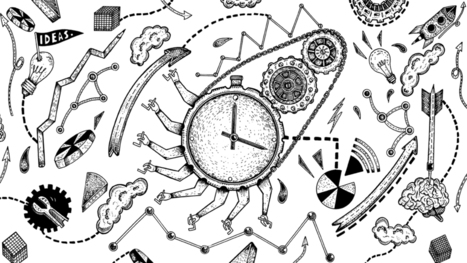 Your new post is loading...
 Your new post is loading...
With all the “be your best self now!” hullabaloo, we can get overwhelmed with what we think we should be doing. We can drive ourselves crazy thinking about all the things we could do to make ourselves smarter, stronger, better. Not long ago, I actually found myself surrounded by whiteboards sketching out all of my self-improvement plans for the year, kanban board style. And while goals and growth plans are great, sometimes the best ideas for change come from an awareness outside of ourselves. I know, it sounds weird to hear a leadership coach telling you to look for something outside of yourself. I’m all about tuning into that courageous and all-knowing voice who can tout your fabulousness–it’s good stuff. But let’s get real: Sometimes the only way to get perspective about what needs to change comes from an outside perspective. Yes, believe it or not, there is often a gap between who we desire and think we are presenting to the world, and the way others see us. Turns out that when you ask the people around you–the ones who see you in action every day and are impacted by the choices you make–where you can grow, their ideas might be a little different than your own.
Via The Learning Factor
You probably know that powerful people receive dozens, if not hundreds, of unsolicited requests every day. And at networking events or speaking engagements, the most influential folks in the room usually have to fight back a scrum of people hoping to get a word in or hand off a business card. To get on their radar, you have to do more than cold email and hope for the best, or push your way to the front of the line at industry mixers. The better way to connect with superstars isn’t to get in front of them and ask them for things. As Duke University professor and author Dorie Clark put it, “The world is competing for the attention of the most successful people,” she wrote for Harvard Business Review. “If you want to meet them–and break through and build a lasting connection–the best strategy is to make them come to you.” Here are a few ways to do that.
Via The Learning Factor
Running a successful organization requires lots of moving pieces running smoothly in tandem. At the heart of every organization are people just like you and me, whose performance can be influenced in a positive direction. Recently, companies like Google and Facebook have been redefining the standards of workplace culture, and in turn seeing improvements in employee satisfaction and company performance. Now, your company might not be large enough to have a dedicated HR (or “People Ops”) department, but there are some exciting takeaways from social psychology that you can apply to benefit your business. Reciprocity Principle Reciprocity is one of the famous “Six Principles of Persuasion” defined in Robert B. Cialdini, Ph.D.'s book, Influence: The Psychology of Persuasion. The idea is that we feel pressure to repay others for what they have given us or done for us. We often even give back more than we were initially given to minimize any guilt associated with the initial favor. Founders and CEOs can use this to their advantage. Internally, this can help improve or repair work relationships, win over co-workers and build consensus. As Dr. Cialdini writes, reciprocity is so powerful that it can overcome feelings of suspicion or dislike toward the person who gives the gift or favor. As a small business owner, how about giving gifts or bonuses on holidays or birthdays? You could also offer to bring back coffee for the office or surprise your colleagues with breakfast or lunch. A kind gesture can go a long way. Outside the office, the reciprocity principle can help you succeed in negotiations, build valuable business partnerships and win over investors — or even customers! When we launched our product and were at our first trade show full of retail managers and buyers, we realized that people only stopped at our booth if we handed them a free sample. So we handed samples to everyone who walked by! In turn, they stopped, listened to our pitch, and 99% of the time they placed an order for their store. In those first few hours, we sold over 100 cases into 100 new stores.
Via The Learning Factor
Steve Jobs famously said that creativity is just connecting things. But anyone facing a creative block knows it’s a lot harder than grabbing ideas out of thin air. Creativity is a complex process. There’s no “creativity gene” or section of your brain responsible for creative thought. We can’t choose to turn creativity on or off. As the Atlantic reports, many studies have found that creativity happens unconsciously and beyond our control. Yet despite its elusive nature, creative thought has become an increasingly important part of our lives. Basic tasks are being automated. Competition is getting more fierce. And your ability to come up with novel ideas is now one of your greatest skills. So whether you’re feeling distracted, out of ideas, or are coming up against a creative wall, here are some creativity exercises to help get the juices flowing.
Via The Learning Factor
To make a good decision, you need to have a sense of two things: how different choices change the likelihood of different outcomes and how desirable each of those outcomes is. In other words, as Ajay Agrawal, Joshua Gans, and Avi Goldfarb have written, decision making requires both prediction and judgment. But how do you get better at either? We’ve published volumes on this subject —here are a few of my favorites — but there are three rules that stand out. Following them will improve your ability to predict the effects of your choices and assess their desirability. Rule #1: Be less certain.Nobel-prize-winning psychologist Daniel Kahneman has said that overconfidence is the bias he’d eliminate first if he had a magic wand. It’s ubiquitous, particularly among men, the wealthy, and even experts. Overconfidence is not a universal phenomenon — it depends on factors including culture and personality — but the chances are good that you’re more confident about each step of the decision-making process than you ought to be. So, the first rule of decision making is to just be less certain — about everything. Think choice A will lead to outcome B? It’s probably a bit less likely than you believe. Think outcome B is preferable to outcome C? You’re probably too confident about that as well. Once you accept that you’re overconfident, you can revisit the logic of your decision. What else would you think about if you were less sure that A would cause B, or that B is preferable to C? Have you prepared for a dramatically different outcome than your expected one? You can also practice aligning your level of your confidence to the chance that you’re correct. Try out quizzes like this one or this one. You’ll realize that while it’s not possible to always be right, it’s totally possible to become less overconfident.
Via The Learning Factor
Here’s a grim stat: More than half of your staff is ready to leave the company, finds a recent Gallup poll. Vacancies impact the productivity and bottom line of your company, but a survey from Globoforce’s Work Human Research Institute uncovered a reason people stick around. When asked the question, “What makes you stay at your company?” the number-one answer, representing 32% of respondents, was, “My job–I find the work meaningful.” “Having a personal sense of meaning in one’s work was even more important than compensation, which ranked as the third most important reason for staying,” says Eric Mosley, CEO of Globoforce, a talent engagement software provider. The trick is that meaning means different things to different people, says Becky Frankiewicz, president of the staffing and talent management provider ManpowerGroup North America. “Our NextGen Work research found that Boomers value being appreciated and recognized, younger people look for purposeful work that contributes to society, while people of all generations desire work that allows them to improve their skills and balance work and home,” she says. “Taking the time to find out what motivates your people individually is the first step to helping them find meaning in what they do.”
Via The Learning Factor
You’re sitting there at your desk with a pit in your stomach. You know you really blew it–and your boss does, too. Maybe you forgot to follow up with an important client and they chose someone else’s proposal. Maybe you didn’t prepare the right documents in time for a super-important meeting. Or a careless typo you made on a spreadsheet or purchase order led to an expensive mistake. Whatever it is, your boss isn’t happy. That’s the bad news. The good news is that you don’t need to start job-searching. In fact, there are a few simple steps you can take right away to rebuild the trust you’ve lost–as quickly as humanly possible. Here’s what to do and when to do it.
Via The Learning Factor
Do you feel like your brain is on serious overdrive? A stream of clutter slowly turning your mental space into a chaotic mess? If the answer is yes, it means that your mind is frantically waving a red flag, begging you to free up some headspace. Just like our cabinets and cupboards, our minds too need tidying up from time to time. Getting rid of all that non-essential mental baggage is crucial to stay focused, motivated and productive. Here are ten simple yet effective tips to help you de-clutter your mind in no time.
Via The Learning Factor
Most companies have articulated their purpose — the reason they exist. But very few have made that purpose a reality for their organizations. Consider Nokia. Before the iPhone was introduced, in 2007, Nokia was the dominant mobile phone maker with a clearly stated purpose — “Connecting people” — and an aggressive strategy for sustaining market dominance. Seeking to extend its technological edge (particularly in miniaturization), it acquired more than 100 startup companies while pursuing a vast portfolio of research and product development projects. In 2006 alone, Nokia introduced 39 new mobile-device models. Few imagined that this juggernaut, brandishing vast resources with such steely determination, could be quickly brought down. In retrospect, it seems inevitable. Nokia was so immersed in executing its strategy that it lost sight of its purpose. When Steve Jobs introduced the first iPhone as “a leapfrog product that is way smarter than any mobile device has ever been, and super-easy to use,” Apple started “connecting people” at astounding new levels. Nokia’s purpose had been co-opted, making its myriad strengths irrelevant. The once-dominant Nokia soon lost much of its market cap and was eventually acquired by Microsoft.
Via The Learning Factor
Companies want to be profitable and maximize their performance and impact both in the world and within their industry. With that said, accomplishing those feats starts with cultivating a culture to allow those things to happen which starts with a priority on employee well-being. Culture is important -- it affects engagement, mindset, reputation, recruitment of talent, and well being. When looking to cultivate a healthy and high performing culture, start by emphasizing these six points:
Via The Learning Factor
Some people just seem to bounce back from whatever life throws at them. Whether it’s illness, loss, or tragedy, they do the tough work of picking themselves up, dusting themselves off, and carrying on—even when it seems impossible. If you’ve ever thought, “I could never do that” when looking at one of these apparent “superheroes,” don’t be so sure. It’s actually possible to build resilience to make yourself better able to bounce back from even the most difficult times. “It’s the ability to get back in the game after you’ve had some sort of failure. And indeed, we can learn to become more resilient,” says social scientist and leadership expert Frank Niles, PhD. Niles says there are a number of science-backed areas people can address to help them be more resilient. Here are some ways you can shore up your “resilience bunker” to better prepare for when tough times strike.
Via The Learning Factor
Are you a micromanager? You will probably say no. Maybe you self-deprecatingly call yourself a “control freak.” Or just “hands-on.” You just “care too much.” And it’s true: You do feel a certain need for a sense of control over your work. You are responsible, after all–perhaps more responsible than some of your coworkers or direct reports. You’re afraid of mistakes and believe that if something needs to be done well, you’d better do it yourself. But this isn’t just because you’re an “independent self-starter” who holds their work to a high standard. It might be that, too, but it’s probably also because you’re feeling stressed.
Via The Learning Factor
Defined hierarchy. Commanding leadership. These corporate ligaments secure firms in the face of threats and unify them against competition. Few beliefs are more widely held in business. The intuition, though, is wrong. “When you look at real organizations, having a clear hierarchy within your firm actually makes people turn on each other when they face an outside threat,” says Lindred Greer, a professor of organizational behavior at Stanford Graduate School of Business. Effective teamwork against threats requires not hierarchy, but egalitarianism; not centralized power, but a culture in which all voices count. Along with Lisanne van Bunderen of the University of Amsterdam and Daan Van Knippenberg of Drexel University, the research team teased out this finding through two complementary studies. In the first study, an experiment, teams of three students developed and pitched a consultancy project to a prospective client. Some of these teams were non-hierarchical, while members of other teams arbitrarily received titles: senior consultant, consultant, junior consultant. Likewise, some teams faced no rivals, while others were told they were competing with a rival firm for clients. The researchers found that the subset of hierarchical teams facing competition with rival firms struggled with infighting while the egalitarian teams cooperated on their work.
Via The Learning Factor
|
If you want to hold brainstorms that unearth better, more creative ideas, it all starts with the number of people in the room. That’s my first tip for you: Follow the “pizza rule” for brainstorming. If you’re unfamiliar with the “pizza rule,” it’s the idea that if you have more people in a room than you could feed with a pizza, there are too many people in that room to hold a productive meeting. The same rule goes for a brainstorming session: If you’ve got a dozen people sitting around a table, expect a really long list of truly mediocre ideas. So, what else can you do other than bribe a group of two to six people with pizza to unearth good ideas? So glad you asked.
Via The Learning Factor
Yesterday I walked into my home office and examined the space from a fresh perspective. It hasn't had a facelift in about ten years and I've hardly noticed its dingy appearance. Don't get me wrong, I love my office but it's simply out of date and no longer reflects my personality. It's time for a change. Approaching the challenge like any diligent, problem-solving coach, I did my research. What does science say about an office space that boosts energy, creativity, and productivity, all while projecting a safe, calm feeling for clients? Yes, it's possible, and you can do it all on your own. Here's what I've learned. 1. Use color, but not just any color.Color psychology studies (and there are many) reveal changes in the body and brain when people view certain colors. These changes influence productivity, creativity, health, stress levels, focus, communication, and emotions. That's some powerful influence! Color psychologist Angela Wright explains the phenomenon this way: "Color travels to us on wavelengths of photons from the sun. Those are converted into electrical impulses that pass to the part of the brain known as the hypothalamus, which governs our endocrine system and hormones, and much of our activity." First decide what's most important about how color affects you, your employees, and your visitors. In an interview with Chris Bailey, Wright offered this simple breakdown of the effects of color on the mind: "The four psychological primaries are: red, blue, yellow, and green. And they affect the body (red), the mind (blue), the emotions, the ego, and self-confidence (yellow), and the essential balance between the mind, the body, and the emotions (green)." But it's not that simple. Bailey nicely breaks down the process of choosing just the right color in this article.
Via The Learning Factor
You’ve heard by now that you need to be “transparent” and “authentic” and to “bring your whole self” to work. More often than not, these phrases are shorthand for expressing your feelings. But while it’s true that you need an emotionally intelligent approach both to build a great work culture and to advance your own career, there’s more to it than just wearing your feelings on your sleeve. Showing emotional savvy isn’t only about candor, though that’s certainly part of it. Properly channeling your emotions in the workplace is a powerful leadership skill. With that in mind, here’s how to calibrate and convey five of the most common emotions you’re likely to experience at work.
Via The Learning Factor
What are the defining attributes of great leaders? That's the age-old question thought leaders and scholars galore have been attempting to answer in mountains of books and literature. While great leadership, to an extent, can be personal and subjective to the follower, there are universal principles you can't argue with (but you can try). Speaking of those thought leaders and scholars, here are six traits that keep surfacing over and over again in the leadership literature and best-sellers. 1. They challenge their own assumptions.Great leaders may be smart and know a lot, but they are humble enough to recognize there are smarter people in the room that they can learn from. They don't restrict themselves from opinions and input outside of their own. They surround themselves with diverse perspectives to help them answer questions like, "How do I know my decision is the right one?" or "Is there a better course of action here?"
Via The Learning Factor
Wasting time is one of the biggest reasons you aren't more successful right now. Review how you've spent your time today, and you'll likely find plenty of unproductive time that you may not have even spent relaxing or preparing to be productive later. Simply planning your day can make a big difference. Science has a lot to say about this. For example, it turns out that our willpower may be better earlier in the day and we need to take advantage of that. The idea is that planning creates a guideline the brain wants to stick to. Here's more on how that helps create success, as well as some other approaches that can help.
Via The Learning Factor
Behind every great athlete there is an even greater coach. There isn't a top athlete--from Muhammad Ali to Tiger Woods to Serena Williams--who did not need a mentor to help them reach the top of their profession. If you think about it, your business is similar to that of an elite athlete. You may have the drive, the skills, and the vision, but there are times when you need professional guidance to ensure you stay on the right path, and how to best utilize your talents and work on your shortcomings in order to reach your goals. An executive coach can be that person. No matter where you are on your career path--from eager up-and-coming manager to a seasoned senior executive to an entrepreneur--there will be times when you can benefit from some professional coaching.
Via The Learning Factor
Tis the season for stress. The holidays are crazy enough, but add in year-end deadlines and sales goals, performance reviews, and the news of yet another raise not given, and you can already feel your blood pressure rise. But there’s good news: You can still stay healthy, even when work is insane. It’ll just take a little extra effort. “When stress takes over, often the first things to go are the ones we need the most–sleep, water, exercise, whole nutritious foods,” laments nutritionist Brigitte Zeitlin. “And that can actually compound the issue, leaving you less equipped to handle the stress well.” Here’s exactly what you can do to keep that from happening before work gets really crazy.
Via The Learning Factor
While clear-cut introverts and extroverts may be few and far between–with most people falling somewhere on the “ambiversion” spectrum–there is such a thing as an “entrepreneurial personality,” broadly speaking. That doesn’t mean all successful entrepreneurs are the same, of course. But for all the personality traits they don’t have in common, there are a few core characteristics successful founders share–and some of those traits are more obvious than others. After all, whenever you read about or personally encounter a successful entrepreneur, you’re observing only the surface of where they are in the present moment. These are some of the more decisive internal qualities that drive founders’ success, no matter which qualities they outwardly project.
Via The Learning Factor
Most companies have articulated their purpose — the reason they exist. But very few have made that purpose a reality for their organizations. Consider Nokia. Before the iPhone was introduced, in 2007, Nokia was the dominant mobile phone maker with a clearly stated purpose — “Connecting people” — and an aggressive strategy for sustaining market dominance. Seeking to extend its technological edge (particularly in miniaturization), it acquired more than 100 startup companies while pursuing a vast portfolio of research and product development projects. In 2006 alone, Nokia introduced 39 new mobile-device models. Few imagined that this juggernaut, brandishing vast resources with such steely determination, could be quickly brought down. In retrospect, it seems inevitable. Nokia was so immersed in executing its strategy that it lost sight of its purpose. When Steve Jobs introduced the first iPhone as “a leapfrog product that is way smarter than any mobile device has ever been, and super-easy to use,” Apple started “connecting people” at astounding new levels. Nokia’s purpose had been co-opted, making its myriad strengths irrelevant. The once-dominant Nokia soon lost much of its market cap and was eventually acquired by Microsoft.
Via The Learning Factor
Some people just seem to bounce back from whatever life throws at them. Whether it’s illness, loss, or tragedy, they do the tough work of picking themselves up, dusting themselves off, and carrying on—even when it seems impossible. If you’ve ever thought, “I could never do that” when looking at one of these apparent “superheroes,” don’t be so sure. It’s actually possible to build resilience to make yourself better able to bounce back from even the most difficult times. “It’s the ability to get back in the game after you’ve had some sort of failure. And indeed, we can learn to become more resilient,” says social scientist and leadership expert Frank Niles, PhD. Niles says there are a number of science-backed areas people can address to help them be more resilient. Here are some ways you can shore up your “resilience bunker” to better prepare for when tough times strike.
Via The Learning Factor
New research shows that it may not be the sound itself that distracts us…it may be who is making it. In fact, some level of office banter in the background might actually benefit our ability to do creative tasks, provided we don’t get drawn into the conversation. Instead of total silence, the ideal work environment for creative work has a little bit of background noise. That’s why you might focus really well in a noisy coffee shop, but barely be able to concentrate in a noisy office. One study, published in the Journal of Consumer Research, found that the right level of ambient noise triggers our minds to think more creatively. The researchers, led by Ravi Mehta of the University of Illinois Urbana-Champaign, examined various levels of noise on participants as they completed tests of creative thinking.
Via The Learning Factor
Being more productive is about working smarter, not harder, and making the most of each day. While this is no easy feat, getting more done in less time is a much more attainable goal if you’re not sabotaging yourself with bad habits. Following are 16 things you should stop doing right now to become more productive.
Via The Learning Factor
|



 Your new post is loading...
Your new post is loading...


















































Receiving feedback is hard. Here are some tips on how you can be better at it.